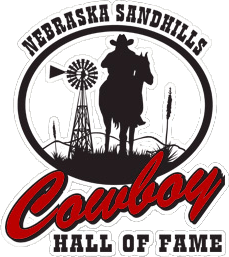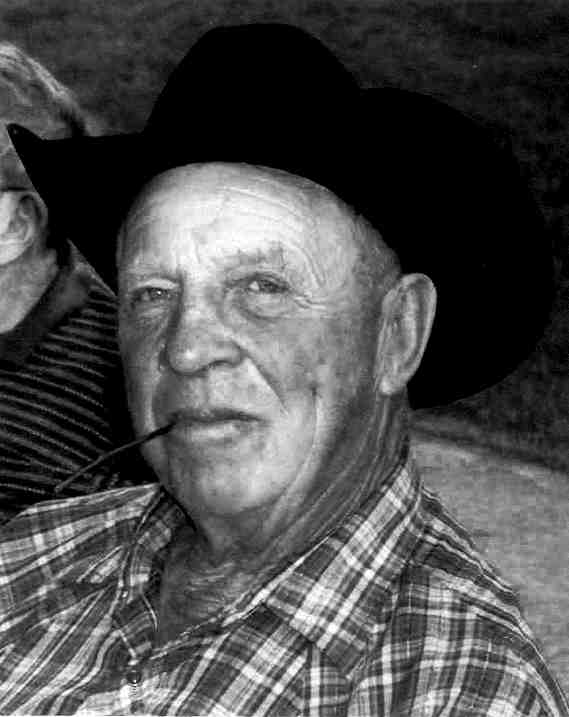April 14, 1930 – February 25, 2009
Melvin Earl Nation was born April 14, 1930 in Lusk, Wyoming, the second youngest of eight children. His parents, Earl and Iva (Hamaker) bought a homestead relinquishment in 1909. The land located in Sioux County was approximately 30 miles from Harrison, Nebraska and 30 miles from Crawford, Nebraska. By the time the Nations moved onto their land, their families had been in western Nebraska for over 10 years. Earl's parents, Henry Thomas and Olivia (Spotts)had homesteaded in Dawes County near Belmont, Nebraska in 1887. A year later Iva's parents, RSQ and Alice (Haworth) Hamaker homesteaded nearby. Although Melvin was born in Wyoming, he spent his entire life in Sioux County, NE.
In 1950, Melvin married Thelma (Callaham). Both sets of her grandparents had also been early settlers in western Nebraska. Her paternal grandfather, Earl Callaham was a cowhand with the Swan Cattle Company before him and his wife, Mabel, settled on a homestead near Harrisburg,Nebraska. That's where Thelma's father, Elmer, grew up. Verna Stockton Callaham's parents,Ed and Hester Stockton, had come to Banner County in 1903. They traveled from Montana in an early "camper," a small house he had designed to fit on a horse-pulled wagon.
Melvin said he never wanted to be a farmer. He wanted to be a cowboy and a stockman. He and several other young men started spending their Sundays at the newly established Hoover Stock Contracting Company Ranch on the Wyoming/South Dakota border. In 1949, he entered the bull riding competition in the Fourth of July rodeo in Crawford. It was the town's first PRCA rodeo.He won $200, a month's wages. Fifty years later, Melvin and some of his fellow competitors were chosen as Grand Marshall for the Fourth of July parade in honor of their competition at that first rodeo.
In 1951, looking for a stable position, Melvin hired on as a ranch hand on the Hat Creek Ranch in northwest Nebraska, but most Sundays were still spent on the Hoover Ranch. He did love working at Hat Creek, a ranch established in 1879 by CF Coffee but he didn't always get along with Coffee's grandson, Bill, who operated the ranch with his father, John.
"I was topping off a stack of hay. Bill didn't' like the way I did it. I was a young hot head. And if I'm really truthful with myself I knew I wanted to rodeo. I threw my pitchfork off the top of the stack. It landed between Bill's feet—just where I aimed it. I climbed off the stack and told him I quit. At that moment in time, I hated Bill Coffee. I went to work for Hoover and rodeoed on the side. But in 1953, I went back to work for Bill. I've spent most of my life on the Coffee Ranches. And somewhere along the line, Bill and I became friends." Melvin Nation said in2009.
The Nation's first daughter Ramona, quickly nicknamed Moni, was just nine months old when the couple moved to Hat Creek. She was two when they moved to the Warbonnet Ranch 10miles west of her first home. Warbonnet, located approximately 10 miles east of the Wyoming border had been established by the Emmons and Brewster Cattle Company in 1879. Bill Coffee
purchased the ranch in 1941 from John Anderson who, before buying the ranch had served as an Emmons and Brewster ranch hand. Melvin's role on the ranch quickly evolved into that of a foreman. He helped train the Coffee Quarter Horses that were rapidly becoming recognized assome of the top in the breed. He planted hundreds of trees on the ranch and helped put together an irrigation system that improved hay production. On the weekend he still entered a few rodeos, although he traded bull riding for steer wrestling, but his primary emphasis was on ranching.
"As far as I'm concerned, Warbonnet is the best little ranch in the country." Melvin said in2007. "And Bill improved every part of it. I took a lot of pride in that ranch. We had several horse sales at Hat Creek, and I had rode most of the horses that crossed the corral. The horses won shows all over the United States. Of course all I'd ever wanted to do was ride good horses and be part of a great ranch. I had both at Warbonnet."
The last two of the Nation's children, daughter, Robbin, and son JimBob, were born in 1954 and1961 respectively. The Nation children drew up helping their father work cattle, run hay equipment and do whatever else needed to be done on the ranch. Both daughters were married when Melvin and Thelma bought the Nation homestead in 1970. JimBob was 12 when the couple moved to the "Home Place" in 1973.
Economically, the late 1970's and the early 1980's had devastated many farming and ranching operations. Melvin did what he could to survive. He ran cattle, trained horses and eventually developed a custom combining operation. He also served as Sioux County Commissioner for four years. But in 1986, a year after JimBob was killed in a car accident, Melvin returned to the Coffee ranches, as the foreman at Hat Creek.
In the years Melvin had been gone, Bill had leased the ranch. When Melvin returned there were few cattle on either of the Coffee ranches. Fences needed fixed and buildings needed repaired.Melvin simply went to work. That fall, Bill purchased 500 head of cows. When Bill died in2005, in addition to yearlings, calves and bulls, there were over 1,000 head of mama cows on the ranch. The day Bill died, he and Melvin had discussed the construction of a water project that Melvin had designed to improve the water situation at Hat Creek. The project, like two others that they'd just finished, was designed to improve the ranch. For both of them that was their ultimate goal in life.
Shortly before his death Bill had leased the ranch to Dave Hergert. Melvin continued to serve as foreman on the ranch after Bill's death.
"Melvin was such an important part of all our lives." Arm Coffee Wachman said in a 2009interview. "He worked so hard and accomplished so much. I'll never forget how well he looked after my mother's interests after my Dad died. Melvin loved the ranch as much as Dad did. The history of the ranch has to include Melvin."
In 2007, after interviewing many cowboys and cattlemen across Nebraska, Olive Bucklin, a producer for NETV, decided she wanted Melvin to be one of the three main narrators of the documentary she was producing. The finished product, "Beef State" was completed in 2008.Characteristically, Melvin skipped the movie's premier. He had hay to put up.
On February 5, 2009, after spending the morning sorting replacement heifers on horseback Melvin suffered a stroke. For the next 20 days he continued to give orders from his hospital bed,worrying about buying new bulls, getting ready for calving, and the construction of a new stock tank. He was also looking forward to celebrating the 100th anniversary of the Home Place,which he still owned. He didn't fuss about the restrictions produced by the stroke. Instead, he and his grandson designed a lift system for his four-wheeler and organized the construction of ramps at the house and the barn. He treated his nurses and doctors with kindness and respect.He suffered another stroke on February 23, 2009 and died two days later. He was 78 years old.Several of his nurses made the 80 mile trip to Harrison to attend his funeral and joined the 500+others who were in attendance.
"I wondered why God didn't just take Grandpa that morning when we were working cattle."Melvin's grandson Bryan Hourt said in 2009. "I know he would've preferred it that way, but I think Grandpa had one more lesson to teach all of us. He never complained. He never yelled at the nurses or whined because he'd been given a raw deal. He knew he'd probably never walk again, but he never quit fighting to get better. He'd often told us that the mettle of a man was determined in the bad times, that it was easy to be a good man when things went well. I think that's what he showed us the last three weeks of his life. He showed us how to be a truly good man."
In 1993, Melvin and Thelma had accepted the responsibility of raising their great-grandson,Cody. Melvin said that he believed Cody should receive a fair shake in life. Cody lived with them the rest of their lives. He now ranches with his grandfather, continuing the legacy his great-grandfather left behind. In addition, Melvin and Thelma have nine other great grandchildren.
Neither Melvin nor Thelma had a high school education but by the end of their lives they'd watched one daughter graduate from college and another become a ranch in he own right. Everyone of their six grandchildren received a higher education. Three have Master's degrees, two of those grandchildren are teachers and one is a mechanical engineer. Another grandchild is also a teacher, one has a degree in criminal justice, and one is a CNA. Melvin strongly believed that a person should learn something new every day. He was proud that their children and grandchildren took that belief to a higher level.
Melvin Nation never owned a massive ranch. He never banked a million dollars or owned thousands of cattle. He lived his entire life in Sioux County, Nebraska and never wanted to go anywhere else. He spent nearly 50 years as the foreman on the Coffee Ranches in Sioux County.He believed it was his job to work harder than any of the hired hands he was supervising. He lived by the creed that a man "worked for the brand" and loved the ranch and its operation. At times he and Bill Coffee clashed. Melvin never let anyone, not even the boss, stomp on what he truly believed. But the pair also treated each other with mutual respect and trust. They were partners. They were ranchers.
Melvin was once asked if he considered himself a cowboy or a cattleman. He said he'd considered himself a cowboy for many years, but that he hoped he developed into a decent cowman. His friends and family saw him as both.

